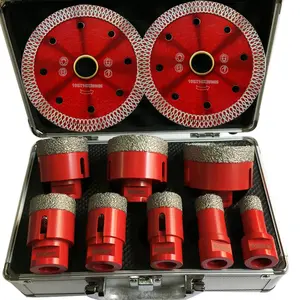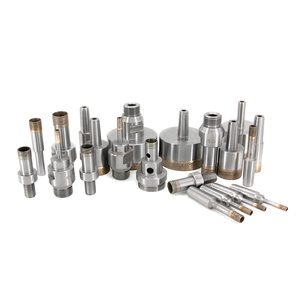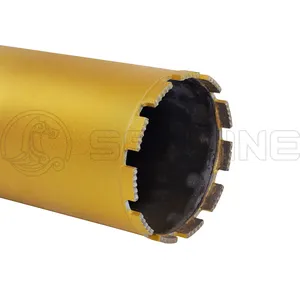Types of Diamond Drill Core Bits
Core drilling is the process of extracting a cylindrical core sample from a solid material. Diamond core drill bits are the primary tools used in core drilling, which involve a drill bit with a hollow, cylindrical barrel lined with industrial-grade diamonds. Core drilling is mainly done to make holes in hard-to-drill material like concrete, asphalt, masonry, glass, ceramic, and rock. Core drilling is frequently used in geology to extract rock samples or in construction to create holes for pipes, vents, or lighting. There are several types of diamond core drill bits:
- Wet Core Bits: Wet core bits are designed to cool and lubricate the drill bit by the water that runs through the bit during drilling. In addition to cooling the bit, they also control dust and ensure fast drilling. They are commonly used for concrete, granite, and other hard materials. Using wet core bits, landscape and hardscape professionals can make precise holes in the hardest materials.
- Dry Core Bits: Unlike wet core bits, dry core bits operate without water. They have a segmented diamond rim or crown that captures and grinds the material while drilling. Dry core bits are suitable for drilling through concrete, masonry, and other non-ferrous materials. However, they are only sometimes reliable, and overheating can become a safety hazard.
- SDS Core Bits: SDS core bits use SDS drilling systems that help secure the core bit to the drill. Whether an SDS Plus or SDS Max, they are both interchangeably used on an SDS hammer as a rotary tool to drill into concrete. The bit has grooves similar to hitch-like objects that allow it to lock into place inside the drill, preventing any slipping or movement while drilling, which makes it very effective and reliable.
- Repairable Core Bits: Repairable core bits are drill bits with changeable barrels. They offer the advantage of having their worn-out barrels replaced, providing extended use and cost efficiency. These repairable core bits cater to diverse drilling needs, allowing businesses to select bits with particular diamond configurations for different materials.
- General Core Bits: General core bits come in standard sizes and diamond configurations for general-purpose drilling. They are suitable for a variety of materials.
- Specific Core Bits: Specific core bits are designed for precision drilling in particular materials or applications, probably with unique diamond patterns or bit sizes.
- Handheld Core Bits: Handheld core bits are smaller, lighter core bits designed for handheld power tools. They offer portability and versatility for quick, on-the-go drilling in various materials.
Specifications and Maintenance
- Sizes: Core bits may come in different diameter sizes. They can drill anything from small to large holes. The exact size range will vary. Typically, bits will come in diameter increments of at least 1/8-inch. The most common sized bits are the following: 0.39-2.36 in.
- Length: The core bit length determines how deep it can drill. Standard lengths range from 8 to 24 inches. Shorter bits work for shallow holes, while longer ones are needed for depth. A 12-inch length is common for general use. Custom lengths are available for specific projects.
- Shank Size: Core bits connect to drills via a shank. The shank size must match the drill's chuck. Common sizes are 1/2 inch, 5/8 inch, and 3/4 inch. An adjustable shank allows use with different machines.
- Material and Coating: Core drill bits have diamond segments set in metal alloy, which includes high-quality steel. The material provides durability and precision when drilling through tough surfaces. The matrix does wear down over time, as it must let diamonds protrude for maximum effectiveness.
As with all tools, proper care is essential for drill core bits to function optimally over time. Following these core drill bit maintenance tips can help extend their lifespan and maintain performance:
- Clean After Use: Thoroughly clean core drill bits immediately after use. Remove any debris, dirt, and coolant buildup using a soft brush or cloth. This prevents clogging of the segments and stops rust formation.
- Dry Properly: After cleaning, dry the drill bits completely to avoid surface rust. Wipe them down with a lint-free towel. Store in a dry location. Do not leave them wet.
- Avoid Impacts: Take care not to drop or knock the bits against hard surfaces. Impacts can damage the cutting edges and affect precision. Treat them gently.
- Lubricate Threads: Apply a small amount of lubricating oil to the threads after each use. This prevents them from getting stuck during future attachments. Wipe off excess to avoid attracting dirt.
- Store Properly: Store core drill bits in a rack or case that protects the cutting edges. Hanging them vertically is ideal. Keep away from moisture and chemicals that could corrode.
Application scenarios of diamond drill core bits
Diamond core bits are used primarily in the construction industry, geological prospecting, and environmental and municipal engineering.
- In the construction industry, diamond core drill bits are used primarily for cutting holes in walls, ceilings, and floors. The holes may be needed for installations like electrical conduits, plumbing, and HVAC systems, as well as for anchor points, load-bearing points, and window and door openings. Core drilling is a precise way to create the openings needed without damaging the surrounding material or compromising structural integrity. Different types and sizes of core bits are available to meet diverse needs.
- In geological prospecting, diamond core bits are the primary drill bits used in mineral resource exploration. They are used to drill deep geological faults and obtain rock stratum samples. The samples are then analyzed to find the distribution and mineral composition of the strata. Moreover, diamond core drill bits can be applied to drill holes for geological surveys, such as water level measurement, ground temperature measurement, and soil resistivity measurement.
- In municipal engineering, diamond core drill bits are used to drill holes for pipelines, cables, and other urban infrastructure. They are also used for street repair and maintenance work. Additionally, diamond core drill bits can be used to make holes for scientific research equipment installation, such as meteorological stations, environmental monitoring stations, and remote sensing stations.
How to choose diamond drill core bits
A good, durable, and reliable diamond core drill bit can make all the difference in bringing efficiency to the drilling process. When attempting to choose the diamond drill bit, these helpful factors are useful:
- Bit Material: Knowing the core drill bit's material can help determine its compatibility with the target surface. Generally, diamond bits are specifically manufactured to provide the best drilling experience for distinct surfaces.
- Coating: The coating on the core drill bit can impact its performance and durability. It's essential to choose a coating that meets the specific drilling needs and conditions.
- Diameter and Length: Select the size of the core drill bit based on the required hole dimensions and drilling depth. Ensure that the bit's diameter and length are suitable for the specific application. Core bits for diamond core drillers come in different sizes and specifications. Determine the required diameter and length based on the project's needs. Ensure that the size chosen can achieve the desired hole size and depth.
- Bit Design: Consider the design of the core drill bit, such as the segment configuration and tooth shape. Choose a design that optimizes cutting performance and efficiency for the specific material being drilled.
- Tool Compatibility: Ensure that the diamond core drill bit is compatible with the drilling equipment being used. Check the bit's mounting system and specifications to ensure a proper fit and safe operation.
- Budget: While it's important to consider budget constraints, prioritize quality and performance when selecting a diamond core drill bit. Investing in a high-performing bit can lead to cost savings through increased efficiency and reduced downtime.
Q & A
Q: Which diamond drill core bits are available for choosing different materials?
A: They are usually available for concrete, asphalt, granite, marble, porcelain, glass, stone, countertop, and ceramic materials. Please confirm with the sellers before buying.
Q: What are the power options for the diamond drill core bits?
A: The bits are usually compatible with electric, pneumatic, hydraulic, or power tool-operated drills. Please confirm with the sellers before purchasing.
Q: What are the drill bits sizes and types to buy?
A: The size and type of bit to purchase depends on the specific project requirements, including the material to drill, the diameter and depth of the hole required, and the drill being used. Please consult an expert to determine the size and type of diamond drill core bit that will work.
Q: What certification do diamond drill bits have to comply with?
A: Unlike electrical devices, a bit does not have to comply with any nationwide or international certification. However, some bits may have ISO manufacturing standards that ensure quality and reliability. That may be more prevalent in core bits of premium quality.




























































































































































































